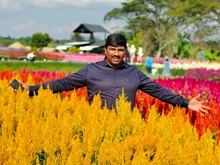
Agriculture specialists have warned wheat farmers, particularly those who have grown late varieties, to be careful and use moderate watering to avoid crop loss as a result of rising temperatures.
Dr. Karanjit Singh Gill, the chief agriculture officer in Faridkot, said that a spike in temperature at the time of germination is bad for the wheat crop because it may affect output, especially in late-sown crops, and farmers may lose yield.
Due to the dry weather, farmers that sowed wheat, particularly in the latter week of November or the first week of December, must use light irrigation as needed.
Farmers must ensure that they go irrigation when the wind is not blowing to avoid crop damage from fallen leaves, he said.
Meanwhile, agriculture specialists have asked farmers to keep an eye on their fields and report any signs of yellow rust.
"To protect the wheat crop from yellow rust, dissolving 120 grams of Nativo (combination fungicide) in 200 liters of water per acre should be sprayed," Gill stated.
Yellow rust is a fungus that causes powdery yellow stripes to appear on leaves. These stripes obstruct photosynthesis, causing the grain to shrivel and the plant to stop growing.
Dr. Karanjit Singh Gill, the chief agriculture officer of Faridkot, said that a spike in temperature at the time of germination is bad for the wheat crop because it may affect output, especially in late-sown crops, and farmers may lose yield.
According to Gill, the attack of brown planthoppers on wheat harvests has increased as a result of rising temperatures.
As a result, farmers must inspect their wheat on a frequent basis.
"The rise in temperature will have an impact on the yield," Amandeep Keshav, project director, Agriculture Technology Management Agency (ATMA), Faridkot, said.
"However, farmers who have adopted crop residue management and sown wheat without removing and burning paddy residue are unlikely to suffer any losses."











